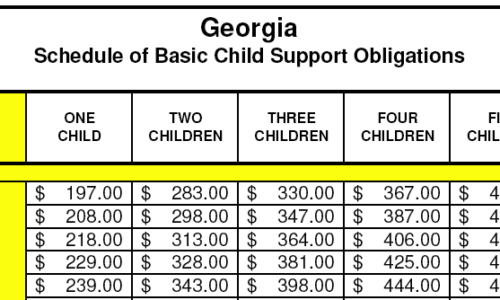Child Support Laws in Georgia 2023

Overview of Georgia Child Support Laws in 2023
This Child Support article Updated January 2023. See the newest full version at How to Calculate Payments in Georgia 2022
The purpose of this article is to provide a top-level view of child support laws in Georgia to inform parents involved in paying, receiving or collection matters in 2023.
Child support laws in Georgia are reviewed and sometimes revised. Most of these changes receive very little public fanfare. When they become law they immediately impact new divorce cases and divorce modifications. If you are a divorced parent with minor children it may help you to stay current on support payment laws.
Significant Changes in 2020
House Bill 481 – Georgia Heartbeat Bill
A highly controversial bill signed into law in 2019, and set to be implemented in January 2020, makes the father liable for support payments. Per Macon Judicial Circuit District Attorney David Cooke, “The father is liable to pay support beginning of the moment, essentially, of conception,” he said. “So he is responsible for the cost of medical care up until the child is born. Then at that point, it will be like it is now here – the father pays once the child is born.”2
Who Drives Child Support Laws in Georgia?
The Georgia Commission on Child Support is responsible for establishing and regularly reviewing support guidelines, development and maintenance of the Georgia Child Support Calculator, recommending legislation, providing training throughout the State to judges, attorneys, and the public, and many other duties.1
Major Child Support Updates in 2018
In 2018, via Georgia SB427, the state of Georgia enacted remarkable changes to support laws. These changes are what you might call “common sense provisions” that help parents with the realistic aspects of receiving and paying court-ordered support payments.
Step Down Clause
The Court now requires that “step-down” language be added to the final divorce documents. This allows support payment amounts to change as children age out and leave younger siblings. Essentially, it eliminates the need to come back to court and request a reduction in support payments as children turn 18 years of age.
A good description of the Step-Down Clause is made by Texas Divorce lawyer Jacqueline Cannon in a comment on Avvo. Ms Cannon stated, “A step down clause for child support is used in situations where there is more than one child a person pays child support for. A person will pay a certain amount of child support for however many children there are and when the parent paying support becomes no longer obligated to pay for one or more of the children (that child ages out, becomes emancipated, etc.) then the child support amount “steps down” to a lower amount.”.3
In 2007, core revisions were made to implement an “income shares model” for calculating support payments. The new model considers each parent’s incomes and related factors to determine what amount is reasonable. You can learn more about this is another article covering 2007 changes to Georgia child support laws.
How is Georgia Child Support Calculated?
Calculating child support payments in Georgia is relatively complicated due to the numerous factors that affect the calculation. Additionally, the divorce court judge can alter the final decision on amounts of the support payment. You can read another one of our articles to learn about factors that impact support decisions in Georgia. You can also try the official Georgia child support payment calculator to get a rough idea of what payments could be in your situation.
The Basics of Child Support
Temporary Child Support
When a couple separates it’s usually necesary to formally address the shared financial responsibility of parenting. Typically, one parent has primary custody of the minor child(ren) and the other parent has visitation time. Ideally, the parents can agree on providing financial support for their child(ren) while they work through the divorce process. When parents cannot come to an agreement on their own the answer may be seeking court intervention. The court can quickly deliver a reasonable temporary solution that eliminates unnecessary fighting with a temporary order for child support, custody, and visitation.
Final Child Support Order
A Final Child Support Order is obtained at the time that the divorce is granted. The final support number can either be obtained by agreement between the attorneys or by order of the court after presentment of financial records to the court. The Final Child Support Order will account for which parent is paying for the health insurance of the minor child, private school expenses, extraordinary medical expenses, and often times work-related child care expenses.
Modification of Child Support in Georgia
To change a court order your lawyer will prepare and file a motion for modification. A support modification motion needs to show reasons why the standing order should be modified. Common reasons are that one or both parents have had significant changes in income (up or down), and the needs of the child have substantially changed.
A modification order can be requested only every two years. There are circumstances where the court may waive the waiting period including involuntary job loss, a significant change in parenting time, or a non-custodial parent not exercising available visitation.
When Does Child Support Stop in Georgia
In Georgia, financial support obligations for children can be terminated with the occurrence of any of the following circumstances:
- The death of the child
- The child turns 18 years of age and graduates from high school. (but not to exceed 20 years of age)
- A minor child is legally emancipated.
How to Legally End Child Support in Georgia
It is extremely important for you to understand that a court order remains in effect and enforceable until it is vacated, or reaches a defined set of requirements as set forth in the Courts Order. Should you find yourself in a position where your parental rights are terminated you will still be obligated to provide financial support until an adoption of your child is finalized.
Laws on Child Support Enforcement in Georgia
Unfortunately, it is not uncommon for a parent to be late making monthly support payments. If someone is behind by a payment or two you may be able to talk and agree to a way to catch up. For chronic payment issues, especially when past due balance continues to grow, filing a support enforcement action or filing a Motion for Contempt is your best option to make things right.
A parent who is failing to obey a court order can be found in contempt of court. Potential penalties include fines and jail time – in addition to still having to pay the full past-due amount of monetary support.
Collecting Overdue Support Payments
Past due support payments can be collected in a number of ways. The collection of overdue child support payments can be pursued even after child support payments are no longer due.
The Parental Accountability Court (PAC) program is one option for collecting support which also works to keep at-fault parents from going to jail. An article published by the AJC summarized the program as, “Under the program, which typically lasts 18 months, parents are assigned a coordinator who helps match their needs with community resources. They are required to meet at least once a month with a Superior Court judge to discuss their progress, their plans for the immediate future and their long-term goals. Above all, the program focuses on helping parents get and keep jobs. Participants do not “graduate” until they have consistently met their montly support obligations for at least six months.”.4
Wage garnishment is a common method of collecting support funds that are in arrears. When a parent fails to pay court-ordered support as directed, the court may garnish paychecks for the normal amount, plus an extra amount, until the past due amount is recovered.
Other ways to collect overdue include:
- Withholding child support from unemployment or worker’s comp benefits.
- Intercepting tax refund payments.
- Suspending driver’s, professional or occupational licenses
- Filing liens to seize bank accounts, lump-sum settlements or property.
It is very important to understand how laws apply to your specific situation. To fully understand your rights, you should contact a child support expert.
FOOTNOTES
- 1 Judicial Council of Georgia, “Child Support Commission”, October 1, 2019, Available from LINK SOURCE
- 2 Tiffany Thompson, “District Attorney: Georgia heartbeat bill may mean father pays prior to child’s birth”, May 8, 2019, Available from WGXA-TV News
- 3 Jacqueline Cannon, “What is the step down clause for child support?”, March 22, 2010, Available from AVVO
- 4 Gracie Bonds Staples, “Child support scofflaws given alternative to jail”, May 19, 2017, Available from AJC Online


